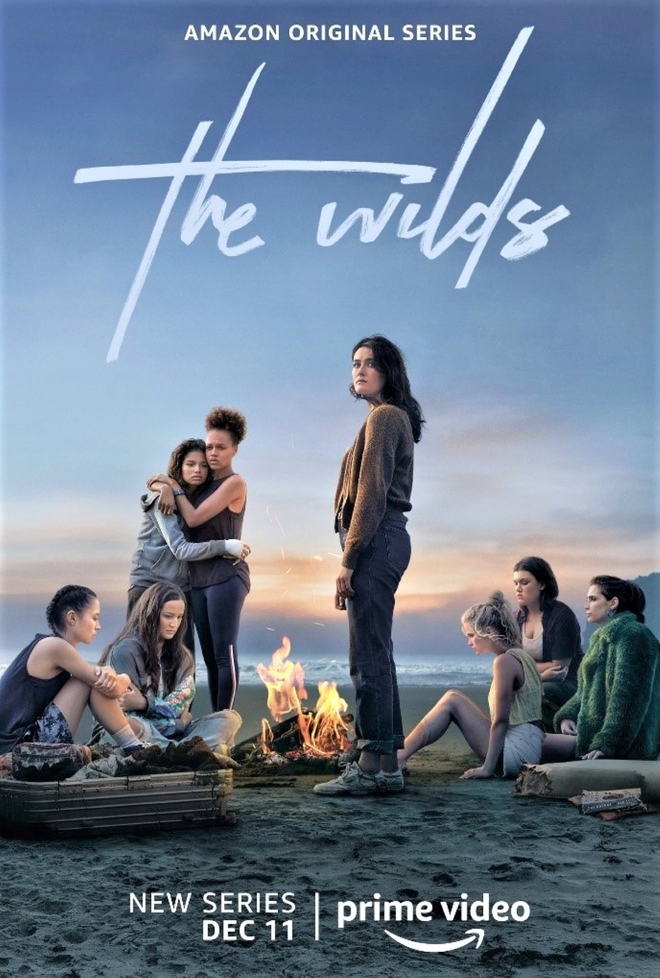Features, Movies / TV
The Wilds is potentially a good show but the stereotypes are so loud it ruins it
*This article contains spoiler alerts*
During quarantine, I haven’t watched much tv…
I’ve been watching documentaries and movies. Documentaries for raw story-telling and movies for entertainment and craftsmanship. TV series always let me down. Once great shows become a pile of confusion and W.T.F. moments. Plot holes, poor character development, and age-old stereotypes can ruin a series.
A friend of mine, knowing my growing distaste for television, hipped me to a new show called The Wilds on Amazon Prime. At first, I dismissed his suggestion, but when he told me I reminded him of a character on the show, I gave it a watch.
Initially, I thought the series was pretty good, I binged over the course of three days. I appreciated the show’s complex themes of confronting patriarchy while giving teenage girls a voice. On the surface, The Wilds is progressive, but character stereotypes make it hard to watch.
The plot
A group of teenage girls survive a plane crash and are “stranded” on an island in the Pacific. Little do they know Gretchen Klien, a deranged psychiatrist played by Rachel Griffiths is holding a Truman Show experience. Each one has been hand-selected to be there. Instead of healing and breakthrough, the island leads the girls to a path of destruction.
The Wilds Stereotypes
The Angry black woman
Rachel Reid played by Reign Edwards, is the twin sister of Nora Reid played by Helen Howard. Rachel is a “former” athlete who can’t let go of her past status of being an Olympic hopeful. In the show, Rachel is aggressive. She lashes out at everyone. The conflict lies in her need for independence and Nora’s need to save her.
It is interesting that neither look alike. It is even more interesting that these actresses are playing biracial twins. Rachel “the angry black woman” sports her natural kinky hair and is darker than her twin. Nora who’s hair is loosely textured looks racially ambiguous; she is also quiet and subvariant. I can’t help but notice the play on colorist stereotypes. Darker-skinned ambiguous black women are always seen as angrier and louder than their light-skinned counterparts. While lighter-skinned black women are seen as more feminine (submissive).
The Sexual Free Spirit
Fatin Jadmani played by Sophia Taylor Ali screams the free-spirited stereotype. The writers here had much potential to further develop her story beyond her sexuality and her attitude. Fatin comes from a well-off Muslim family. She is a cellist and her mother’s high expectations of her are deafening. Fatin escapes her overbearing mother and aloof father with sexual expression. She uses her sexuality to cope. Why can’t her expression just be her? Her story in episode 5, attempts to redeem her but is shut out by her continuous careless and lazy attitude on the island.
The Crazy
The “crazy girl”, Leigh Relike, is played by Sarah Pidegon. Leigh is obsessively in love with a writer, who is 20 years her junior. Their relationship ends abruptly. On the island, she is so lovesick that puts everyone’s lives at risk.
To add insult to injury, everyone thinks Leah is crazy. She is the only one on the island that feels as if something is not right. Leah is constantly gaslighted, preyed upon, and deemed psychotic. This “crazy” stereotype has been closely associated with women, especially white women, since the dawn of time. It seems like the writers are building up her crazy just so she can have the Aha moment: “See, I wasn’t crazy” moment in the end.
White Savior Complex, Damsel in distress, and Beauty Supremacy
Shelby Goodkind, played by Mia Healey exemplifies every problematic white female stereotype I can think of. She is a teenage girl from Texas, who comes from a bible thumping family; she is the ray of light. As the ideal beauty, she has long blonde hair, blue eyes, and is trim. Her fatal flaw is she wears dentures to hide missing teeth. Though she suffers from “ugliness” she is put on a pedestal of the island and on the island.
The Tough “Butch” Lesbian
If you aren’t paying attention, you would miss this stereotype! Toni Shalifoe played by Erana Jame plays the “tough butch” lesbian. She plays basketball of course and wears sporty clothing. Toni is also a proud Native American teen who defends her culture and her heritage from white supremacy. I found the references to calling white people “colonizers” to be quite cringy and misplaced.
Tony also has anger issues and abandonment issues making her “tough” and sometimes out of uncontrolled. The writers make it seem as if she has no justifications for her over the top reaction. We don’t get to see her story of why she is the way she is like we see with the other girls.
*There are two other characters in the show that I thought didn’t display such persuasive stereotypes. Those characters are Martha Blackburn and Dot Campbell.
Why Shelby’s character goes beyond stereotypes
We know that stereotypes are problematic. There has so much research, think pieces, and stories from all over the globe about how stereotypes harm and affect us. Time after time, we see Hollywood perpetuates these stereotypes. While the majority of stereotypes hurt people, some stereotypes benefit groups of people. For example, the “smart” Asian is a positive association but it also brings upon negativity aka excruciating pressure to achieve.
I could go on about stereotypes in this series, but I wanted to highlight Shelby’s character. Rarely do we get to analyze white female stereotypes and the harm they cause. With current events, we are well aware of the Karen stereotype, but we are less aware of white beauty (supremacy beauty) and how it harms.
White female beauty is the standard across the globe. This standard is shifting, but it is still prevalent in media and pop culture. In Hollywood, “beautiful white women” are the main characters and romantic interest on screen. Even if the white female character is problematic or flawed, she is still worthy of love and life. Shelby fits this model to a T.
Over the course of the show, we see Shelby as the positive person, always praying and trying to get along with everyone. She comes off as fake in herself and her identity which causes conflict with Toni Shalifoe. Toni is enraged by Shelby’s growing relationship with her best friend Martha Blackburn played by Jenna Clause. The conflict between each other is strong and while it is meant to build up the tension between the two characters it is flat and ultimately superficial.
Toni’s and Shelby’s relationship becomes romantic
In episode 6, it is revealed that Shelby is homophobic. Before the group can cast her off as a bigot, in the same episode, Toni and Martha become deathly ill. It is Shelby who forcibly saves Toni from her fate. Shelby’s bigotry is instantly forgiven for her heroic efforts, but in reality, Shelby’s act of heroism is rooted in guilt.
In a flashback, we learn that Shelby’s homophobia comes from her denying her own sexuality. Shelby’s father played by Warren Kole (a pastor) catches Shelby kissing her best friend Becca Gilroy played by Stefania LaVie Owen. Although Shelby is the one that kissed Becca, she tells her father Becca kissed her messing her relationship with Becca and Becca’s relationship with the community (Becca has already been shamed by the community before). Shelby’s lie causes Becca to commit suicide. This saves her status and current reputation as a beauty. Now we know why Shelby is concentrated on doing good deeds. It is to cover up what happened and her guilt not because she is a good person.
At this point in the series, I could see how this adds depth to Shebly and her storyline, however, from here things become even more cringy.
THE WTF MOMENT
After Shelby saves Toni’s life, they don’t become best friends they become lovers. While Toni attempts to reconcile with Shelby after she saves her life. Shelby kisses her and runs off. This sends Toni over a loop and Toni goes after her. A romantic relationship blossoms between the two and Toni and Shelby decide that their relationship is worth it with Toni’s convincing. Shelby kissed her but it is still hesitant??? But Toni is accepting?
This is one of those WTF moments I was talking about earlier…
I think the writers wanted their relationship to symbolize freedom to be yourself, but it comes off as so cliché. This relationship seems forced by the writers for the sake of inclusion and diversity and it gives Shelby forgiveness even though her past actions were awful; Shelby suffers no consequences.
When there’s diversity there is always a catch
What’s up with writers need to constantly display problematic stereotypes just to use the word “diversity” in vain. If your diverse cast is going to be superficial and full of stereotypes then what is the point? The Wilds is potentially a good show but the stereotypes are so loud it ruins it. The views, the actors, and the script deserves better.
Photo cred: Imd.com



